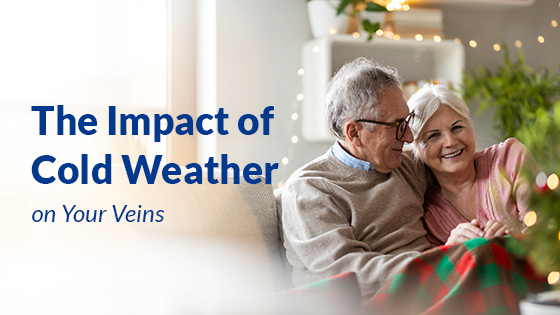Winter is here, bringing cozy sweaters, warm drinks, and... sore veins? While cold weather might seem like a break from swelling or cramping, the season’s unique conditions can make vein issues worse if left unmanaged. Whether you’re navigating varicose veins or simply prioritizing vein health, understanding how winter affects your vascular system can help you stay proactive and comfortable all season long.
The Surprising Impact of Cold Weather on Your Veins
Cold Weather’s Double-Edged Effect
At first glance, colder temperatures might seem helpful for vein health. The cold causes veins to constrict, which can improve blood flow and reduce swelling—a welcome change for anyone dealing with varicose veins. However, the benefits are often short-lived. Dr. Fearon, vein care expert at Summit Skin & Vein Care, advises that, although cold weather may offer temporary symptom relief, it is vital to stay diligent and proactive in managing vein health during winter. When your circulation becomes sluggish due to inactivity or lower atmospheric pressure, blood can pool in the legs, leading to discomfort and exacerbated symptoms.

Winter’s Sedentary Lifestyle Doesn’t Help
Short days and freezing temperatures tend to keep us indoors and less active. Without regular movement, the calf muscles—which act as pumps to help push blood back to the heart—aren’t engaged as often. This inactivity can allow blood to stagnate, worsening symptoms like heaviness, swelling, and discomfort in the legs.
Proactive Steps to Protect Your Vein Health This Winter
Thankfully, there’s plenty you can do to keep your veins healthy and happy during the colder months.
1. Move to Improve Circulation
Low-impact exercises like walking, stretching, or yoga are great ways to boost circulation without straining your veins. Consider simple steps like walking around the house or doing calf raises during commercial breaks to keep blood flowing.
2. Dress for Comfort and Health
Winter is the perfect time to embrace compression stockings. Not only do they help maintain proper blood flow and reduce swelling, but they also keep your legs warm—an added bonus in the chillier months.
3. Eat and Drink Wisely
A fiber-rich diet paired with plenty of hydration is essential for healthy circulation. Foods like berries, beans, and avocados can support vein health, while staying hydrated helps maintain smooth blood flow.
How Summit Skin & Vein Care Can Help
If you’re dealing with persistent vein discomfort, professional care can make all the difference. At Summit Skin & Vein Care in Lee’s Summit, we specialize in advanced, minimally invasive vein treatments designed to get you back to feeling your best.
Our Services Include:
- Endovenous Laser Ablation (EVLA): A highly effective laser treatment to close damaged veins with minimal recovery time.
- Endovenous Chemical Ablation (EVCA): An innovative treatment that uses a chemical solution to seal problem veins.
- Sclerotherapy: A trusted method for treating spider veins and smaller varicose veins.
Plus, we offer FREE vein screenings to help diagnose issues early and create a personalized treatment plan tailored to your unique needs.
Winter is an ideal time to start treatment. Recovery periods are discreet thanks to seasonal layers, and many patients see results in time to enjoy the spring weather with confidence.
Take Action This Winter
Winter can be hard on your veins, but with the right care and lifestyle adjustments, you don’t have to suffer through the season. Whether it’s staying active, eating well, or seeking expert treatment, every step you take toward healthier veins matters.
Let Summit Skin & Vein Care help you make this winter a turning point for your vein health. Call us today at (816) 533-4398 to schedule your FREE vein screening, and take the first step toward a more comfortable, confident you.
